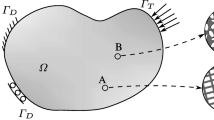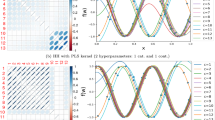Abstract
Uncertainty-based multidisciplinary design optimization (UMDO) is a practical methodology to cope with uncertainties in the design of sophisticated systems. To alleviate the computing burden, the time-consuming computer simulation models are often replaced by metamodels. Nonetheless, inconsistency between metamodel and simulation model, or metamodel uncertainty, could be introduced into the multidisciplinary design optimization process due to lack of data. The optimal solution may deviate from the true result or even become infeasible if the metamodel uncertainty is neglected. In this research, a new UMDO approach based on polynomial chaos expansion (PCE) for feedback-coupled systems is proposed aiming at improving the accuracy and efficiency of UMDO process under metamodel uncertainty. In this approach, PCE is utilized for the Kriging metamodel uncertainty propagation. The decoupled formulation is used to solve the UMDO. PCE is integrated into the decoupled UMDO framework naturally since the PCE coefficients could be regarded as design variables, which can assure the satisfaction of disciplinary consistency by matching the distribution mean and variance functions of coupling variables under stochastic uncertainty. Then, a modified particle swarm optimization algorithm is proposed to implement the UMDO efficiently. The effectiveness of the proposed approach is verified by a mathematical problem and a fire-detection satellite design problem.












Similar content being viewed by others
References
Amaral S, Allaire D, Willcox K (2014) A decomposition-based approach to uncertainty analysis of feed-forward multicomponent systems. Int J Numer Methods Eng 100(13):982–1005. https://doi.org/10.1002/nme.4779
Andrews PS (2006) An investigation into mutation operators for particle swarm optimization Evolutionary Computation. In: CEC IEEE Congress on: IEEE, pp 1044–1051. https://doi.org/10.1109/CEC.2006.1688424
Balling RJ, Sobieszczanski-Sobieski J (1996) Optimization of coupled systems—a critical overview of approaches. AIAA J 34(1):6–17. https://doi.org/10.2514/3.13015
Brevault L, Balesdent M, Berend N (2016) Decoupled multidisciplinary design optimization formulation for interdisciplinary coupling satisfaction under uncertainty. AIAA J 54(1):186–205. https://doi.org/10.2514/1.J054121
Clerc M (2006) Confinements and biases in particle swarm optimisation.
Du XP, Guo J, Beeram H (2008) Sequential optimization and reliability assessment for multidisciplinary systems design. Struct Multidisc Optim 35(2):117–130. https://doi.org/10.1007/s00158-007-0121-7
Eberhart R, Shi. Y (2001) Particle swarm optimization: developments, applications and resources. In: Proceedings of the 2001 Congress on Evolutionary Computation. Seoul, South Korea, IEEE, pp 81–86. https://doi.org/10.1109/CEC.2001.934374
Ghanem R, Spanos P (1991) Stochastic finite elements: a spectral approach. Springer, New York. https://doi.org/10.1007/978-1-4612-3094-6
Ghosh S, Lee CH, Mavris DN (2014) Covariance matching collaborative optimization for uncertainty-based multidisciplinary aircraft design. In: 15th AIAA Multidisciplinary Analysis and Optimization Conference, AIAA Paper: 2014-2872. https://doi.org/10.2514/6.2014-2872
Gratiet LL, Marelli S, Sudret B (2017) Metamodel-based sensitivity analysis: polynomial chaos expansions and gaussian process. Handbook of uncertainty quantification. Springer, Cham, pp 1289–1325. http://arxiv.org/abs/1606.04273
Haykin S (1998) Neural networks: a comprehensive foundation, 2nd edn. Prentice Hall PTR, Upper Saddle River
Hu X, Chen X, Larttarulo V, Parks GT (2016) Multidisciplinary optimization under high-dimensional uncertainty for small satellite system design. AIAA J 54(5):1732–1741. https://doi.org/10.2514/1.J054627
Jiang Z, Chen S, Apley DW, Chen W (2016) Reduction of epistemic model uncertainty in simulation-based multidisciplinary design. ASME J Mech Des 138:081403. https://doi.org/10.1115/1.4033918
Jin R, Du X, Chen W (2003) The use of metamodeling techniques for optimization under uncertainty. Struct Multidisc Optim 25(2):99–116. https://doi.org/10.1007/s00158-002-0277-0
Kennedy J, Eberhart RC (1995) Particle swarm optimization. In: Proceedings of the IEEE international conference on neural networks. Perth, Australia, New York, IEEE Press, vol IV, pp 1942–1948. https://doi.org/10.1109/ICNN.1995.488968
Kim C, Choi KK (2008) Reliability-based design optimization using response surface method with prediction interval estimation. ASME J Mech Des 130(12):121–401. https://doi.org/10.1115/1.2988476
Liu H, Chen W, Kokkolaras M, Papalambros PY, Kim HM (2006) Probabilistic analytical target cascading: a moment matching formulation for multilevel optimization under uncertainty. ASME J Mech Des 128(4):991–1000. https://doi.org/10.1115/1.2205870
Liu Y, Shi Y, Zhou Q, Xiu R (2016) A sequential sampling strategy to improve the global fidelity of metamodels in multi-level system design. Struct Multidisc Optim 53:1295–1313. https://doi.org/10.1007/s00158-015-1379-9
Liu J, Meng X, Xu C, Zhang D, Jiang C (2018) Forward and inverse structural uncertainty propagations under stochastic variables with arbitrary probability distributions. Comput Methods Appl Mech Eng 342:287–320. https://doi.org/10.1016/j.cma.2018.07.035
McAllister CD, Simpson TW (2003) Multidisciplinary robust design optimization of an internal combustion engine. ASME J Mech Des 125(1):124–130. https://doi.org/10.1115/1.1543978
Shanock LR, Baran BE, Gentry WA, Pattison SC, Heggestad ED (2010) Polynomial regression with response surface analysis: a powerful approach for examining moderation and overcoming limitations of difference scores. J Bus Psychol 25(4):543–554. https://doi.org/10.1007/s10869-010-9183-4
Shi Y, Eberhart RC (1999) Empirical study of particle swarm optimization. IEEE, Washington, pp 1945–1950. https://doi.org/10.1109/CEC.1999.785511
Sun G, Li G, Gong Z, He G, Li Q (2011) Radial basis functional model for multi-objective sheet metal forming optimization. Eng Optim 43(12):1351–1366. https://doi.org/10.1080/0305215X.2011.557072
Vapnik V, Golowich S, Smola A (1997) Support vector method for function approximation, regression estimation, and signal processing. In: Advance in neural information processing system 9. MIT Press, Cambridge, MA
Viana FAC, Simpson TW, Balabanov V, Toropov V (2014) Metamodeling in multidisciplinary design optimization: how far have we really come? AIAA J 52(4):670–690. https://doi.org/10.2514/1.J052375
Wang D, Wang GG, Naterer GF (2007) Collaboration pursuing method for multidisciplinary design optimization problems. AIAA J 45(5):1091–1103. https://doi.org/10.2514/1.19472
Wertz JR, Larson WJ (1999) Space mission analysis and design, 3rd edn. Microcosm Press, Torrance, pp 353–497
Xiu D, Karniadakis GE (2002) The Wiener–Askey polynomial chaos for stochastic differential equations. SIAM J Sci Comput 24(2):619–644. https://doi.org/10.1137/S1064827501387826
Xu C, Liu Z, Tao W, Zhu P (2020) A vine copula-based hierarchical framework for multiscale uncertainty analysis. ASME J Mech Des 142(3):031101. https://doi.org/10.1115/1.4045177
Xu C, Liu Z, Zhu P, Li M (2020) Sensitivity-based adaptive sequential sampling for metamodel uncertainty reduction in multilevel systems. Struct Multidisc Optim 62:1473–1496. https://doi.org/10.1007/s00158-020-02673-6
Yang JM, Chen YP, Horng JT, Kao CY (1997) Applying family competition to evolution strategies for constrained optimization. Lecture notes in computer science, 1213. Springer, pp 201–211. https://doi.org/10.1007/BFb0014812
Yao W, Chen X, Luo W, Tooren MV, Guo J (2011) Review of uncertainty-based multidisciplinary design optimization methods for aerospace vehicles. Prog Aerosp Sci 47:450–479. https://doi.org/10.1016/j.paerosci.2011.05.001
Zaman K, Mahadevan S (2013) Robustness-based design optimization of multidisciplinary system under epistemic uncertainty. AIAA J 51:1021–1031. https://doi.org/10.2514/1.J051372
Zhang S, Zhu P, Chen W, Arendt P (2013) Concurrent treatment of parametric uncertainty and metamodeling uncertainty in robust design. Struct Multidisc Optim 47:63–76. https://doi.org/10.1007/s00158-012-0805-5
Funding
The authors would like to acknowledge the support from Key National Natural Science Foundation of China (Grant No. U1864211), Natural Science Foundation of Shanghai (Grant No. 21ZR1431500).
Author information
Authors and Affiliations
Corresponding author
Ethics declarations
Conflict of interest
On behalf of all authors, the corresponding author states that there is no conflict of interest.
Replication of results
Detailed flowcharts of the proposed methods have been presented in Sects. 3.2 And 3.3, one can follow them and reproduce the results. The Kriging metamodels are built by the toolbox SURROGATES, which can be learned about through the website (http://sites.google.com/site/felipeacviana/surrogatestoolbox). The PCE models are constructed by the toolbox UQLab, which can be learned through the website (https://www.uqlab.com).
Additional information
Responsible Editor: Erdem Acar
Publisher's Note
Springer Nature remains neutral with regard to jurisdictional claims in published maps and institutional affiliations.
Rights and permissions
About this article
Cite this article
Liu, Z., Song, Z. & Zhu, P. A novel polynomial chaos expansion-based method for feedback-coupled multidisciplinary design optimization under metamodel uncertainty. Struct Multidisc Optim 65, 117 (2022). https://doi.org/10.1007/s00158-022-03207-y
Received:
Revised:
Accepted:
Published:
DOI: https://doi.org/10.1007/s00158-022-03207-y




